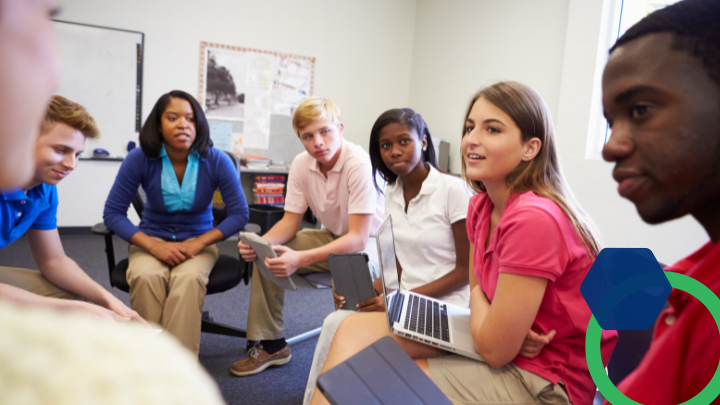As we have seen over the past few years, students (and educators!) are facing mounting challenges in student behavior and social-emotional learning. But one key to helping students overcome tough situations is through executive function strategies.
Executive function skills, which include working memory, impulse control, and cognitive flexibility, develop rapidly during early childhood, support school readiness and social-emotional competence, and serve as a foundation for effective learning and adaptation.
That’s why BetterLesson is partnering with Reflection Sciences to create strategies that support building executive functioning skills in students. These strategies highlight essential skills that students, with educator support, can make a big difference in classroom behavior as well as benefiting students in their personal growth.
Executive Function (EF) is a group of skills needed for the deliberate, goal-directed self-management of attention, thought, action, emotion, and motivation.
With our partnership, we’re building on our commitment to social-emotional learning by offering executive functioning strategies as a foundation for student success and supporting the whole student.
What skills make up executive function?
Being reflective instead of reactive is at the heart of executive function.
Here are three of the skills that make up executive function.
Working Memory
Working memory is the ability to hold information in your mind so it can be used to guide your behavior; it is important for keeping specifics in mind for the purpose of completing a task.
How does this impact students?
Working memory helps students follow directions with multiple steps by keeping track of what they’ve already done and what they need to do next.
Example
Students instructed to “read the assignment on the board, take out your math tools, do the assigned work, and then talk through your answers with a partner” can remember all these steps and complete them in order.
Impulse Control
Impulse or inhibitory control is the ability to ignore distractions and inhibit impulsive responses by waiting our turn or doing something more appropriate than what first pops into our heads.
How does this impact students?
Impulse control is Important in regulating a student’s actions and thoughts at the appropriate time.
Example
One example is a student’s ability to pay attention to a teacher and resist a side conversation with a friend. This task involves taking a moment before acting and ignoring distractions to be able to focus their attention.
Cognitive Flexibility
Cognitive flexibility means thinking about something in multiple ways.
How does it impact students?
Cognitive flexibility is important for problem-solving and perspective-taking. Sometimes called “thinking outside the box,” it also includes the ability to switch gears when a situation changes and calls for something else.
Example
For example, cognitive flexibility includes considering someone else’s perspective on a situation or brainstorming a different way to solve a problem. For switching gears, it means that students are able to differentiate behavior that is encouraged at the playground versus behavior at a library.
Why should executive function matter to schools?
Executive function helps us to reflect on why a student may be behaving a certain way or struggling to control themselves and gives educators a better idea of how to respond most effectively. It’s the foundation for many of the terms we use every day to describe student behavior: self-regulation, willpower, planning ahead, perseverance, self-control, and other similar ideas about conscious, effortful skills that can be developed—but only with the support of strong executive functioning skills
By teaching executive function skills, students are able to develop the attitudes, behaviors, and social-emotional competence they will need into their adolescence and adulthood.
But with so many students experiencing disruptions and inconsistencies to learning modalities, managing behavior has increasingly become difficult.
That’s why we’re proud to offer three new strategies to support schools in helping students build their executive functioning skills.
Executive function strategies
Understanding Executive Function Skills
This strategy guides you in developing awareness and understanding of executive function–what it is, how it helps, and why it matters to students and their development. You’ll learn how executive function shows up in students and the influence it has as well as resources to purposefully create space to develop these skills with your students.
Developing a Growth Mindset with Executive Functioning Skills
This strategy helps students develop a growth mindset using executive functioning skills to calm down, assess the situation, and proceed with clarity using three steps: pausing, visualizing, and retrying. By stopping to identify feelings that are coming up, visualizing a solution or different outcome, and then approaching the situation with a new path forward, students are able to develop skills that can support them as they face challenges.
By helping students learn how to navigate through challenges with specific skills to accomplish specific outcomes, this strategy helps educators normalize changing a perspective or attitude and reinforce and empower students to be their own problem-solvers.
Responding to Setbacks with Executive Function Skills
We all experience setbacks, but the key to overcoming them is how we respond. The same is true for students. Instead of letting our emotions get the best of us, this strategy teaches students a process they can use to overcome challenges.
In this strategy, students investigate what they’re feeling, brainstorm solutions, and then identify an executive function skill that can help them reach their solution. Giving students the opportunity to practice how to be responsive in tough moments helps them to eventually be able to tap into their skills independently both in and out of the classroom.
Learn more
Supporting students to close academic gaps while honoring their social-emotional development means that we need to meet them where they are to get them where they need to be.
Discover more about executive function skills with our BetterLesson webinar. You’ll leave with concrete and actionable takeaways to incorporate in your practice that offer support to better manage and support behavior.
Watch Now







